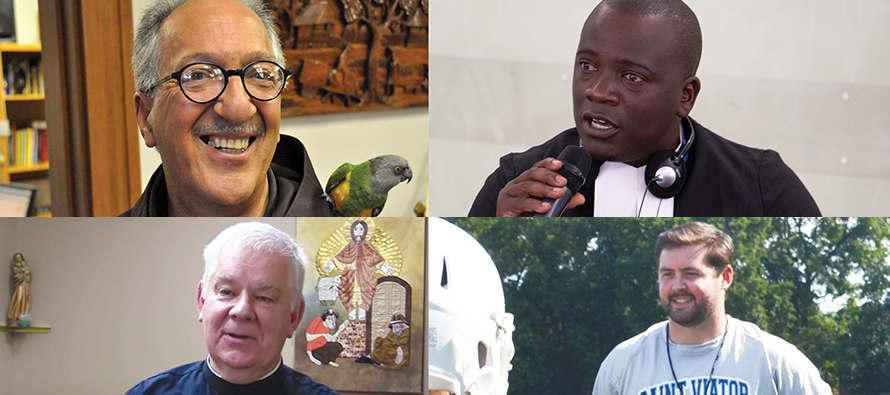The secret’s out: Brotherhood is powerful

Brothers are drawn to a life where they are able to immerse themselves completely in ministry, service, community life, and prayer. (Photos courtesy of the Franciscan Friars of St. John the Baptist Province; De La Salle Brothers; Viatorian Fathers and Brothers; Archdiocese of Toronto)
SOMETIMES RELIGIOUS BROTHERS are described by what they are not. Brothers are not priests, do not preside at sacraments, and cannot be parish pastors. However, no vocation should be noted mainly for what it isn’t, for God’s invitation is always positive, an active opportunity to respond.
Brother Rob Robertson, C.S.V., a brother with decades as a member of the Viatorians, describes brotherhood more fully: “I could be doing the exact same thing that I do as a religious if I were a layperson, but the fact that I’m doing it as a religious brother allows me to do it more generously and more freely. My time is completely about my ministry. When I come home, I come home thinking about how I can minister more. What more can I do?” When he’s home with his brothers, a uniting force is their shared dedication to the same mission.
- Brother Peter Lamick, C.S.V. and Brother Rob Robertson, C.S.V. discuss brotherhood in depth in “Religious Brothers Day: Roundtable with Brother Rob and Brother Peter”
- ReligiousBrothers.org
- TodaysBrother.com
His confrère, Brother Peter Lamick, C.S.V., adds an important detail: “Everyone can do the things I do—I’m trying to set an example and spread the joy for living those gospel values. We do a lot of the ministries laypeople do, and there’s a solidarity with laypeople.”
For these men, living their religious life as perpetually professed brothers in apostolic community, the draw was and is the chance to immerse themselves completely in ministry, service, and community life—especially prayer. While the life of a brother may be similar to that of a layperson, the religious vows of poverty, chastity, and obedience govern their lives in a distinctive way. Plus, the steadiness of prayer and community life with a religious community brings a nourishing structure.
Men who seek rich community life, dedication to prayer, solidarity with the laity, and the chance to be profoundly present to the people of God ought to give religious brotherhood a good, long look. There are two basic types of brothers: apostolic (active, ministry-oriented) and monastic (focused on prayer in a monastery).
Apostolic religious life
Apostolic religious communities read the signs of the times and seek to bring to life the vision of their founder. This means going places and serving the people of God in a variety of ways.
As such, these religious brothers are placed in ministries where they can take their community’s spirituality into interpersonal work and ministerial accompaniment. Their work may unfold in traditional pastoral ministries within parish life or campus ministry; or it may play out in social work, teaching, educational or nonprofit leadership, or any number of things.
Monastic religious life
Some brothers live their religious lives in monasteries as monks. Their religious lives unfold within the cloister—the walls or boundaries that demarcate the monastic life from the life of the world. Monasteries are meant to be places of work and prayer, where members focus on a structured, disciplined life to grow closer to God and offer a faithful, prayerful example of holiness. While monastic life is largely enclosed, visitors are welcome in limited ways to join in prayer or make retreats in separate areas of the grounds.
Religious Brothers find their natural habitat in [the] context of communion, by way of belonging to the People of God.
. . . The vocation of the Brother is part of the answer that God gives to the absence of brotherhood which is wounding the world today. At the root of a Brother’s vocation lies a profound experience of solidarity that essentially matches that of Moses before the burning bush: he discovers himself as the eyes, ears, and heart of God, the God who sees the oppression of his people, who hears their cry, feels their anguish and comes down to liberate them.
. . . Therefore, the dimension of communion is closely linked in the Brother to a fine sensitivity for everything that affects the least privileged of people; those oppressed by various forms of injustice, abandoned on the margins of history and progress, those who, ultimately, are less likely to experience the good news of God’s love in their lives.
. . . The fraternity of Religious Brothers is an encouragement for the whole Church, because it makes present the Gospel value of fraternal relationships of equality in the face of the temptation to dominate, to search for the best place, or to exercise authority as power.
—Excerpted from “Identity and Mission of the Religious Brother in the Church” (2015, Vatican’s Congregation for the Institutes of Consecrated Life and Societies of Apostolic Life)
The shape of monastic brotherhood varies. For instance, the Trappists at the Abbey of Gethsemane invite discerners to complete a six-month “postulancy,” (early preparation period) after which they may continue into a two-year novitiate (formal preparation program). As novices, these men become brothers and continue discerning their vocation as brothers with the community and its formation directors.
The Benedictine Monks of Saint Meinrad Archabbey explain monastic brotherhood like this: “Whether ordained or not, we are all monks, and that is the primary vocation for everyone in the monastery at Saint Meinrad.” When you look at the monks, it is hard to tell the difference between those who are ordained priests and those who are not. Monks who are also priests use the title Father while other monks go by Brother.
In any case, men who continue into religious life in a monastic community will spend most or all of their lives on the monastery grounds, working and praying with that group of men. Each monastery has its own personality in the way it prays, interprets the vows, and so on. While all religious brothers are dedicated to prayer and community life, the main distinction from apostolic brotherhood is that monks live solely in their enclosed community while apostolic brothers could be placed anywhere that their community ministers.
Although some communities have members who begin religious life as brothers and eventually become ordained as priests, the main way to think about brotherhood is as a permanent way of life.
How to discern brotherhood
Is God inviting you to be a brother? When you reflect upon the sacraments, do you feel drawn to pastoral formation and accompaniment, to liturgical planning, to hospitality? Brothers are involved in such work. They often serve in the important roles of acolyte, sacristan, liturgical preparation, and sacramental catechesis.
When you reflect upon servant-leadership, are you drawn to grassroots pastoral work, such as organizing people, being part of a working group, or serving as director of a ministry? Again, the roles that brothers play are many and varied.
When you reflect upon community life, how would you engage in a community of faith and fit with other members? Are you drawn to an egalitarian, working-side-by-side approach? Brothers have a unique flexibility and openness that allows them to be present and provide a quiet example of faith not only to members of their community but to the laypeople they serve in ministry.
For Brother Peter Lamick, C.S.V., brotherhood is largely about the way he can fully throw himself into teaching: “You really have to be willing to go to great lengths to try to help people and serve people. To be an educator is more than just teaching content. It’s about building relationships with people and really taking seriously those relationships you have.”
Brother Rob Robertson adds that the shape of his brotherly life is an ideal fit: “[Brotherhood] gives me a lot more flexibility and openness to being more who I am without having that burden or expectations of what a priest should be. I feel like I can get down into the mud with people—dig trenches, nurse babies of drug-addicted mothers, and things that are more who I am.”
And for these two brothers, and many others, community life is what richly sustains them. The consistency of meals and prayer with one’s housemates adds a steadiness for processing the day, sharing spiritually, and hearing about the similar yet different ministries others do. Often, too, it’s the social time after a meal and prayer that brings deep joy and great consolation. The sense of brotherhood, of knowing this group of men will be there for you in good times and bad is the essence of life as a religious brother.
Is God inviting you to be a religious brother?
Related article: VocationNetwork.org, “What does it mean to be a brother?”
Tags
Related
- A call to let go: Profile of Brother Christopher Campos Erran, O.S.C.
- God had a plan for me
- He blends new tech and old prayer: Profile of Brother Joseph Anoop, F.S.P.
- From physics lab to friary—and back again
- Better together: Profile of Brother David Relstab, O.S.A.
- Brothers win the race: Profile of Brother Rafael Vargas, S.D.B.
- God called me to be a brother
- Modern “prodigal son” meets the brothers: Profile of Brother Ray Morris, B.H.
- Brotherhood is right for me
- Big Brother is watching you Read More
Most Viewed
- Find your spirituality type quiz
- Questions and answers about religious vocations
- Celibacy quiz: Could I be a nun? Could I be a brother? Could I be a priest?
- Resources for older discerners or those with physical and developmental differences
- About Vocation Network and VISION Guide


